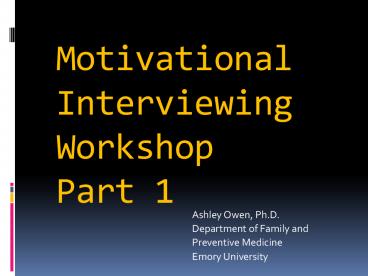Motivational Interviewing Workshop Part 1 Ashley Owen, Ph.D
1 / 19
Title: Motivational Interviewing Workshop Part 1 Ashley Owen, Ph.D
1
Motivational InterviewingWorkshopPart 1
- Ashley Owen, Ph.D.
- Department of Family and
- Preventive Medicine
- Emory University
2
Motivational Interviewing Essential Components
What is it? An interactive, empathetic
listening style. Increases motivation and
confidence.
3
Motivational Interviewing Essential Components
Based on Unconditional Positive Regard Carl
Rogers showing complete support and acceptance
of a person no matter what that person says or
does
4
Open versus closed-ended questions
Motivational Interviewing Essential Components
5
Motivational Interviewing Essential Components
The primary aim of MI is to elicit "change talk"
Positive statements about change and patients
own reasons and arguments for change.
6
Change Talk
Motivational Interviewing Essential Components
the more patients hear themselves argue for
change the more committed they become to that
change.
7
Game Drumming for Change Talk
- Row By-Row Competition
- Listen for patient statements that have been made
in behavior change conversations about improved
glycemic control. - You buzz in (hit your desk ) when you hear a
statement that does reflect change talk. - If you buzz in first in your row, you get the
penny. - (If the statement is in question, you may be
asked to defend your position.) - 4. If youre wrong, you lose a penny.
8
Motivational Interviewing Essential Components
Reflections
? Simple
reflection - simply repeating what patient
says - simply rephrasing (or offering a synonym
for) what a patient says ? Complex
reflection - add new meaning to what a patient
says by amplifying concepts, creating a
metaphor, reflecting underlying feelings,
or really demonstrating empathy in the
summary. - It is NOT giving advice
9
Motivational Interviewing Essential Components
Reflections essential for
?
demonstrating unconditional positive regard ?
clarifying patients difficulties making
change ? reinforcing patients change talk ?
demonstrating understanding ? diffusing
resistance
10
Game Mirror Mirror on the Wall (Effective
Reflections)
1st Each person partner up with someone else
(must be from a different team). 2nd One person
talks about a habit, behavior, or situation that
he or she is thinking about changing. 3rd Listene
rs task is to offer as many reflections as
possible. Talker awards -1 penny per simple
reflection -2 pennies per complex
reflection
11
Game You Cant Resist Me
1st Divide into two sides of the room and select
change behavior. 2nd Side 1 statements from
frustrated patient. Side 2 statements from
standard practice provider. Pass the
ball. 3rd Reverse Side 2 statements from
frustrated patient. Side 1 statements from
motivational interviewing provider. Pass the
ball.
12
Motivational Interviewing Essential Components
In Practice Techniques for Applying these
Skills
? Agenda Setting ?
Assessing Importance and Confidence
13
Agenda Setting Diagram
Coleman, M. and Newton, K. (2005)
14
Setting an Agenda Value
? Gives patients initial control of the
consultation. ? Helps them be more active
participants and more invested. ? First
addressing the patient's concerns can eventually
open the door to your agenda.
15
Assessing Importance and Confidence for Change
How important do you believe it is to change
your smoking, diet, exercise, medication
adherence right now? Rate how important it is
to you on a scale of 1-10, where '1' is not at
all important and '10' is very important.
also rate confidence
16
Motivational Interviewing
Goal- to help patients move along the continuum
of change by
1. enhancing motivation for change
and 2. decreasing resistance to change
17
Role Play CaseA 43-year-old female diabetic
patient (Señora Romero) has been working with you
for about a year now. Her hemoglobin A1c is
currently at a 10, whereas you have told her in
the past that she needs to keep her hemoglobin
A1c at a 7 or below.
18
Role Play Case Diabetic PatientGroup 1
Discuss this patients perspectives on her own
motivations for change focusing on effective
use of reflections.Group 2 Discuss potential
options for change using the agenda setting
techniqueGroup 3 Discuss patients perspective
on how confident and important options are using
the scale concept.
19
Game Name That Technique!
- Groups not role-playing watch the group that is,
and buzz in when they see one of the following
techniques being used - Open-ended questions
- Closed-ended questions
- Reflection (simple or complex?)
- 4. MI Non-adherent (ex. advice-giving,
confrontation, being overly direct) - Each team receives 1 penny per correct
identification of a technique. Role-playing team
receives same number of pennies as the winning
team.

